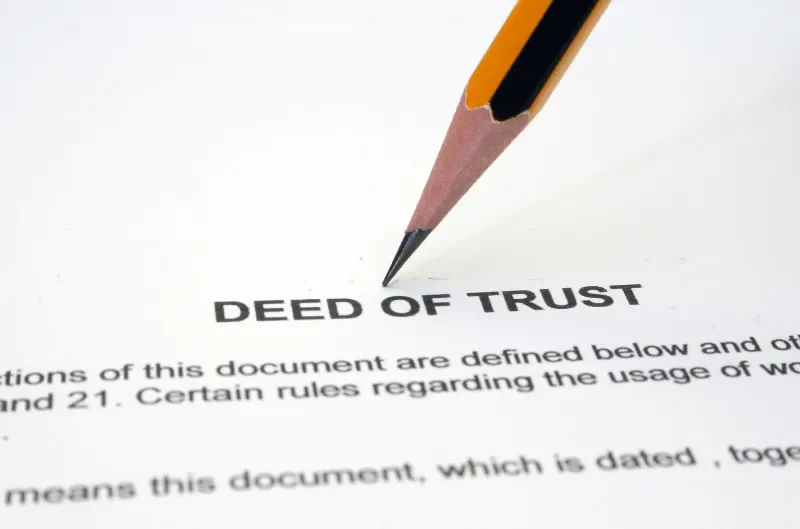
Sell Your House Fast Through Trust Deed Investment
Discover how trust deed investors provide quick cash solutions for homeowners—skip delays, avoid traditional hassles, and close on your timeline.
What is Trust Deed Investment in Real Estate?
When you need to sell your home quickly, trust deed investment can seem like a viable solution. Essentially, trust deed investment involves the sale of a deed of trust to an investor, securing a loan against the property. This process allows homeowners to quickly liquidate their homes and avoid lengthy real estate transactions.
This method is particularly appealing for individuals who are under financial strain, facing foreclosure, or simply need to relocate fast. However, before deciding to sell your home through trust deed investment, it’s essential to understand how the process works and whether it’s the best option for your unique situation.
How Trust Deed Investment Works
In a trust deed investment, the homeowner sells the deed of trust, which is a legal document that secures a loan against their property. The investor who buys the trust deed essentially assumes the role of the lender, and in return, they receive the rights to the loan payments. The homeowner benefits by getting immediate cash, while the investor earns interest from the loan.
It’s a unique form of real estate investment that can benefit both parties. Homeowners who are in urgent need of cash can avoid lengthy sales processes, while investors can earn a steady return on their investment by holding the trust deed.
However, homeowners must understand that by selling the trust deed, they are also selling their ownership rights to the property. This means that the investor may have the authority to take control of the loan and the property if certain conditions aren’t met.
Key Advantages of Selling a House Through Trust Deed Investment
If you’re facing financial difficulties or need to relocate quickly, trust deed investment can offer several compelling advantages:
- Quick Cash Sale: Traditional home sales can take months to close, with inspections, repairs, and negotiations involved. Trust deed investment, however, can close within a matter of weeks, often as quickly as 7-10 days.
- Avoid Foreclosure: If you’re in danger of foreclosure, trust deed investment may provide a quick way out. Selling your home through this method can allow you to settle your outstanding debts and avoid the negative impact of foreclosure on your credit.
- No Repairs or Renovations: With trust deed sales, you typically don’t need to invest in repairs or home upgrades. The investor is primarily concerned with the deed and loan, not the condition of the property.
- Simple Process: There are fewer contingencies involved compared to traditional real estate transactions. No need for appraisals, inspections, or third-party negotiations. The terms are usually straightforward and easier to understand.
Example: Suppose you’re facing foreclosure and need to sell quickly. A trust deed investor can buy the deed of trust on your home for $90,000, allowing you to pay off your loan, avoid foreclosure, and move forward with your life.
The Risks Involved in Trust Deed Investment

While trust deed investment offers quick cash, it’s essential to recognize that there are several risks associated with this method. The investor’s focus is usually on the security of the loan, and they may not offer as much for your property as you would expect in a traditional sale.
1. Lower Sale Price
Unlike traditional sales where you may negotiate directly with buyers, trust deed investors typically buy at a discounted price. The investor assesses the property’s value and offers you an amount that reflects the risk they are taking. This means you may receive significantly less than the property’s market value.
2. Legal Complexities
Trust deed transactions often involve complex legal paperwork. If the terms of the deed aren’t properly negotiated or understood, you could find yourself in a difficult situation. It’s essential to consult with an attorney or a real estate professional to fully understand the legal implications.
3. Risk of Losing the Property
When you sell a trust deed, you are essentially transferring the deed to the investor. If you don’t meet the conditions of the agreement or if there are complications with the loan repayment, the investor may take control of the property. This is a potential risk if you don’t thoroughly understand the terms of the investment.
Hidden Costs of Trust Deed Investments
While the idea of a fast sale might seem appealing, trust deed investments can come with hidden costs that impact the net amount you’ll receive from the sale. Here are some of the costs you should be aware of:
1. Attorney Fees
Since trust deeds involve legal documents, you may need to hire an attorney to review and execute the paperwork. These fees can add up quickly and reduce the final amount you receive from the sale.
2. Title and Closing Fees
Title fees, transfer taxes, and closing costs can add additional expenses to the process. These costs are often borne by the homeowner, meaning they’ll further reduce the proceeds from your sale.
3. Fees for Document Preparation
If you need to prepare additional legal documents, there may be costs associated with this. In some cases, these costs can amount to thousands of dollars, particularly if there are complicated legal elements involved in the trust deed transaction.
Example: If your home is worth $100,000 and the investor offers you $90,000, you may end up paying $5,000 in attorney and closing fees. This leaves you with only $85,000, which is significantly less than what you may have anticipated.
Trust Deed Investment vs. Selling Your House for Cash
When considering how to sell your house quickly, trust deed investment is just one option. However, selling your home for cash may be a simpler and more beneficial route in many cases.
Advantages of Selling for Cash:
- No Hidden Fees: Selling for cash often means no agent commissions, no attorney fees, and no closing costs.
- Fair Offers: Cash buyers typically offer a price that is closer to market value, ensuring that you receive a fair amount for your property.
- Faster Process: Much like trust deed investment, selling for cash can be completed quickly—sometimes in just a few days—without the complications of traditional sales.
- Flexibility: You have more control over the terms of the sale when selling for cash. The buyer typically doesn’t require inspections or appraisals, and they’ll purchase the property as-is.
Example: If you’re offered $90,000 for your home through a trust deed investment but could sell it for $95,000 in a cash sale, you would be much better off with the latter, as you avoid the costs associated with the trust deed sale.
Legal Considerations in Trust Deed Investment

One of the key challenges of selling your home through trust deed investment is understanding the legal aspects involved. Trust deed agreements often come with intricate terms and conditions, which could have long-term implications if not properly handled.
1. Reviewing the Trust Deed Agreement
Before entering into any agreement, it’s crucial to carefully review the trust deed agreement with a legal expert. Pay attention to the interest rates, repayment terms, and the investor’s rights to the property. A poorly structured deal could lead to unforeseen legal or financial consequences.
2. Potential Liabilities
If there’s a default in repayment or issues with the loan, you might still be held liable for outstanding debts. Make sure you fully understand the terms before selling your property through this method.
How Long Does It Take to Sell Through Trust Deed Investment?
One of the main selling points of trust deed investment is its speed. Traditional home sales can take months, while trust deed sales can close in just 7-10 days. If you’re in a hurry to sell your home due to financial issues, foreclosure, or personal reasons, trust deed investment can provide a quick solution.
However, the speed of the sale largely depends on the investor and the specifics of your property. If your property is in good condition and you have a clear title, the process may proceed quickly. However, if the property has legal complications or significant issues, the timeline could be longer.
How Trust Deed Investment Works for Homeowners

The trust deed investment process begins when the homeowner (borrower) is looking to sell their property quickly and wants to take advantage of a secured loan to do so. Instead of selling the home through conventional means, they sell the deed of trust to an investor. This deed serves as the legal document securing the loan, essentially giving the investor rights to the mortgage.
The homeowner benefits by receiving cash from the investor in exchange for the deed. In this process, the property is often sold below market value, but the sale is quick and allows the homeowner to resolve any financial issues in a timely manner.
Key Steps in the Process:
- Property Valuation: The investor assesses the property’s market value to determine the worth of the trust deed.
- Agreement and Sale: The homeowner and investor agree on a sale price for the trust deed. The homeowner receives cash upfront.
- Investor Assumes Debt: The investor assumes responsibility for the mortgage or loan associated with the property, and may eventually take ownership if the homeowner defaults on the loan terms.
It’s crucial to understand that while the sale is quick, it may not offer you the best price for your home. Trust deed sales often result in the homeowner receiving less than the market value of the property, as investors seek to secure a return on their investment.
How Trust Deed Investment Can Help Homeowners in Distress
If you’re behind on your mortgage payments or facing foreclosure, trust deed investment may offer a lifeline. In these situations, homeowners are often looking for the fastest way to settle their debts and avoid losing their property. A trust deed investment can help avoid the long and complex foreclosure process, providing a faster way to get cash in hand.
Benefits in Foreclosure Situations:
- Fast Debt Relief: Trust deed investments can allow homeowners to pay off the remaining debt in a short period, avoiding the negative consequences of foreclosure on their credit history.
- Avoiding a Credit Hit: Foreclosures stay on your credit report for up to seven years, severely affecting your ability to get future loans or mortgages. Trust deed investments offer a way out without damaging your credit long-term.
- No Waiting for Bank Approval: Unlike traditional sales, which require bank approval and can be delayed by loan processing, a trust deed investment is quicker and more straightforward.
If you need to act fast and avoid foreclosure, trust deed investment can offer a much-needed solution. However, you should also consider the lower-than-market-value sale price and additional costs involved before committing.
How to Find Trust Deed Investors
If you’ve decided that selling through trust deed investment is the best route, finding the right investor is critical to ensuring a smooth transaction. Not all investors are the same, and the terms they offer can vary greatly. Here are some tips for finding reliable investors for your trust deed:
1. Do Your Research
Look for established investors with experience in trust deed transactions. It’s essential to work with an investor who understands the complexities of these deals and has a solid track record.
2. Consult a Real Estate Professional
A real estate agent or broker familiar with trust deed investments can help you find reputable investors. They can also help you navigate the process, ensuring you understand the legal terms and are getting a fair deal.
3. Get Multiple Offers
If possible, get offers from several investors to ensure that you’re getting the best deal. Different investors may offer different terms or purchase prices for the trust deed, so comparing these offers will help you make an informed decision.
4. Check for Transparency
Work with an investor who is transparent about fees, timelines, and other costs. Be wary of any investor who is unwilling to provide clear answers to your questions or tries to rush the process without providing full information.
The Role of Interest Rates in Trust Deed Investment

One of the key factors that investors look at when buying a trust deed is the interest rate attached to the loan. For homeowners, the interest rate can play a significant role in the sale process. A higher interest rate often means that the investor stands to gain more from the loan, which may result in them offering less for the property.
Example: If your home has a 5% interest rate and the investor buys the trust deed, they are buying the right to collect that 5% interest on the remaining loan balance. If your loan is for $100,000, the investor will earn interest on that balance, but they may still offer a lower sale price for the property to account for the long-term gains they expect from the loan.
Impact of Interest Rates on Your Deal:
- High Interest Rates: Investors may be more willing to offer a lower price for your home, knowing they’ll make a higher return on the loan.
- Low Interest Rates: Investors may offer a higher price for your property since the return on investment is lower over time.
Before agreeing to the sale, ensure you fully understand how the interest rate impacts the deal and how much the investor is willing to pay for your property.
The Effect of Property Condition on Trust Deed Investment
Unlike traditional home sales, where the condition of the property can affect its market value, trust deed investors are more concerned with the security of the loan rather than the state of the property itself. However, the condition of the property can still impact the offer price.
If your property needs major repairs or has structural issues, the investor may offer a lower price to account for the potential costs involved in fixing the home. While the investor may not require you to repair the property, they will factor in the potential risks of buying a home that may require extensive work.
For homeowners facing financial difficulties, this can be beneficial since it allows you to sell the property as-is without investing in repairs. However, it’s important to understand that the lower price might not reflect the full market value of your home.
How Trust Deed Investment Affects Your Credit Score

One of the significant concerns for homeowners considering selling through trust deed investment is the effect on their credit. A foreclosure or missed mortgage payments can cause long-term damage to your credit report. While trust deed investment can help you avoid a formal foreclosure, it’s important to understand how it may impact your credit score.
1. Potential Credit Damage
If your loan remains unpaid after the trust deed sale, the investor may take legal action to recover the remaining balance. This could impact your credit score, especially if the sale price doesn’t cover the full debt owed.
2. Avoiding Foreclosure
On the positive side, by selling your home through trust deed investment, you may avoid a full foreclosure, which is far more damaging to your credit score. A foreclosure stays on your credit report for up to seven years, whereas a trust deed sale may have a less significant long-term impact.
If you’re looking to sell quickly and avoid foreclosure, trust deed investment can be a viable option. Just keep in mind the potential for legal action if the deal doesn’t fully cover the loan.
Trust Deed Investment vs. Traditional Home Sales: What’s the Difference?
When deciding whether trust deed investment is the right option, it’s important to weigh it against traditional home sales. Here’s how the two methods compare:
| Factor | Trust Deed Investment | Traditional Home Sale |
|---|---|---|
| Sale Speed | 7-10 days | 30-60 days or longer |
| Fees | Minimal or none | Agent fees, closing costs, inspections, repairs |
| Property Condition | No repairs needed | Repairs may be required |
| Market Value | Typically lower than market value | Market value |
| Control Over Sale | Investor-controlled | Seller-controlled |
| Legal Complexity | High, requires careful review | Standard contract terms |
| Credit Impact | Less severe than foreclosure | Can negatively affect credit if foreclosure occurs |
If you need to sell quickly and avoid the hassle of repairs, trust deed investment can be a good option. However, if you can afford to wait and want to maximize your return, a traditional sale may be more beneficial.
Should You Sell Your House Through Trust Deed Investment?
Trust deed investment offers a fast way to sell your home, but it’s not without risks. The lower sale price, legal complexities, and hidden costs are factors that you need to consider before moving forward. In some cases, selling your home for cash may provide a simpler and more financially beneficial option.
If you’re facing foreclosure, need a quick sale, or want to avoid the hassle of repairs and negotiations, trust deed investment could be a viable solution. However, ensure you fully understand the process and terms before making a decision.
For homeowners looking for a faster, simpler, and more financially advantageous option, selling your home for cash might be a better alternative. Cash sales are faster, come with fewer fees, and allow you to sell your property as-is without the complications of trust deeds.
